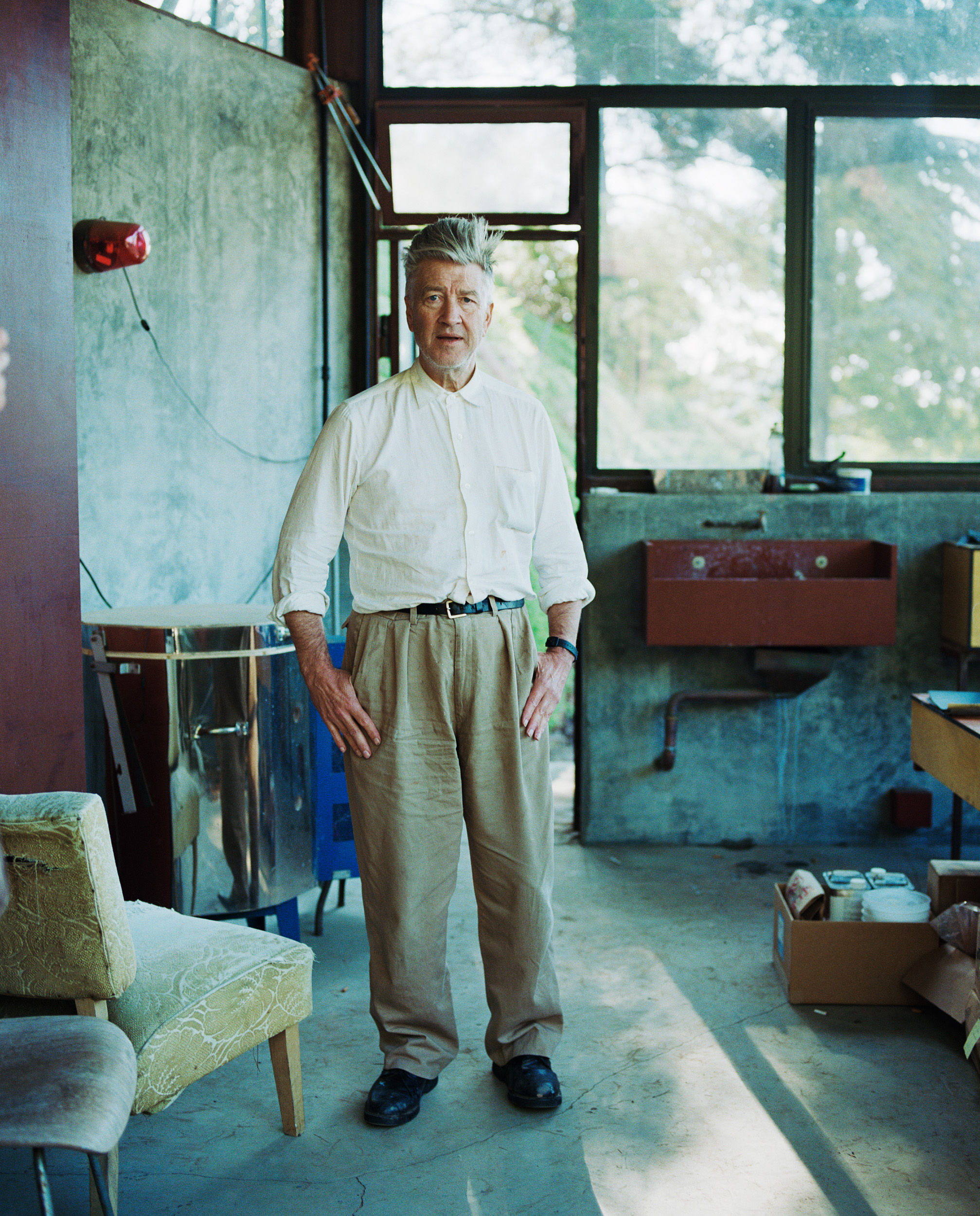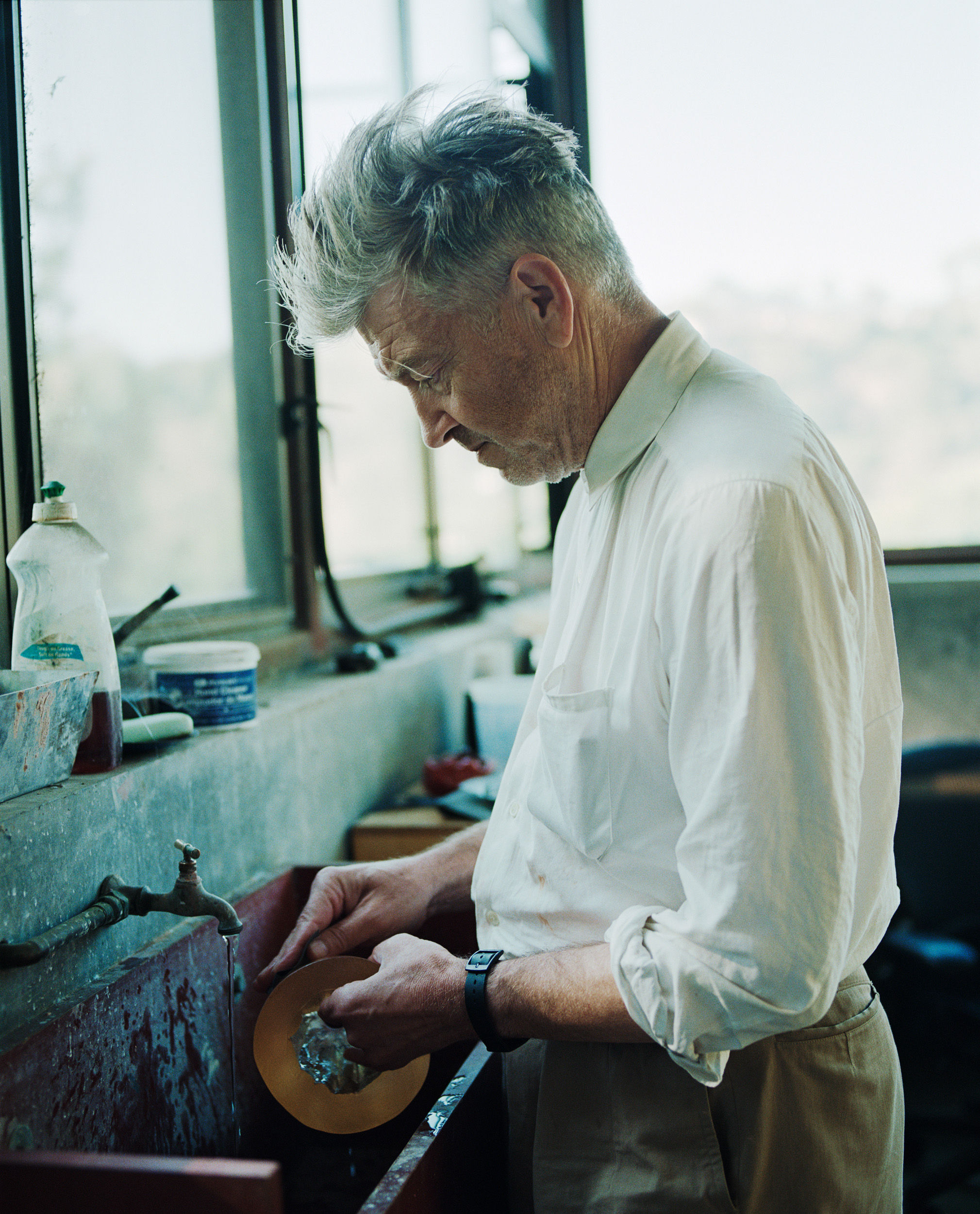
DAVID LYNCH
- Words Robert Ito
- Photos Patrick Fraser
On the power of Transcendental Meditation.

( 1 ) Harry Dean Stanton was a longtime friend and collaborator of Lynch’s, appearing in several of his films, including Twin Peaks: Fire Walk with Me and Inland Empire. A chain smoker, he once said, “I only eat so I can smoke and stay alive.” He died from heart failure at the age of 91 in 2017.
David Lynch has meditated every day, twice a day, since 1973. He made time for it while directing Eraserhead, his debut film about a monstrous, incessantly mewling baby and the hapless man who fathered it, and while on the set of The Elephant Man, his 1980 drama about a severely deformed man in Victorian England. “I haven’t missed a day in 51 years,” he says.
In addition to directing a run of critically acclaimed films—including Blue Velvet, which earned him an Oscar nomination for best director, and the Palme d’Or–winning Wild at Heart—Lynch is a gifted painter, composer and cartoonist. He credits much of his creativity—and joy and energy and peace—to Transcendental Meditation (TM). Twenty minutes in the morning and the afternoon, he explains, is all it takes to begin realizing your full potential as a human being. “Most people waste way more than 40 minutes a day just goofing around.”
In 2005, he founded the David Lynch Foundation, a nonprofit dedicated to increasing awareness about TM. On a call from his home in Los Angeles, Lynch discusses the foundation and its goals, how the practice changed his life and his deep love of smoking.
ROBERT ITO: How did you first come upon Transcendental Meditation?
DAVID LYNCH: My sister told me about it, but I’d been looking into all different kinds of meditations. People call almost anything meditation. Someone will say: My form of meditation is laying out in the sun. Someone else will say it’s riding a bike through the park, or jogging, or a trip to the zoo. But then there’s contemplation types of meditation, where you contemplate something, and concentration forms of meditation, where you concentrate on something. The key to all of it is, Does it make you feel better? Does it change your life? Some forms of meditation give more results than others. The key is consciousness, and in order to get more consciousness, you’ve gotta transcend. You have to go where the consciousness is. It’s within. It’s always been within.
RI: What does that feel like, to transcend?
DL: For me, transcending is like a jolt of bliss. You’re in one place, and then you dip into the transcendent, the field of pure consciousness. It’s like being plugged into an electric circuit; you get a jolt of happiness. It’s very beautiful. And the more you practice this technique, the longer you stay in the transcendent. Short beautiful rides lead to longer beautiful rides. I always say it’s like gold coming in and garbage going out. When you transcend and you’ve experienced this happiness, you have less stress, less depression, less sadness, less fear, less hate, less bitter anger—all negativity starts to dissipate the more you transcend. You start feeling better. You start acting better. You start enjoying more.
RI: If it’s so beautiful, why do it only twice a day?
DL: It’s like watering your lawn. You could water your lawn all day long, but it would erode it. You just need enough to make the grass green, and the rest of the time, you go about your business.
RI: Is there a special place you like to do it?
DL: No, you can meditate anywhere. People meditate in the strangest places, and noise is no barrier. I had one of my most blissful meditations next to a wall, and on the other side, they were jackhammering concrete.
RI: You wrote a book called Catching the Big Fish, where you liken TM to fishing. Do you fish?
DL: I do not fish. But I have fished, and I love fish. I just built a tail for a fish I got at a flea market. It was a mounted trophy fish, but it didn’t have a tail. It broke off, I guess. So I had to build a tail for it.
RI: How is fishing like Transcendental Meditation?
DL: You just meditate the way you were taught, and take it as it comes. That’s what the Maharishi Mahesh Yogi says: Take it as it comes. Never deny the validity of an experience if it happens, but don’t try to replicate it, because trying is not going to work. It’s a non-trying form of meditation.
RI: That sounds just like fishing.
DL: Yeah, exactly. You have to have patience. You have to have a place. And then you just close your eyes and do it.
RI: What are you doing nowadays, and how does TM help you do it?
DL: Well, here’s the thing: I have emphysema from smoking, and so I am kind of homebound. And if I wasn’t a meditator, if I wasn’t transcending every day, I might be pretty miserable, not being able to walk very far without running out of oxygen. But I’m happy inside. I can do lots of things. I’m gonna start some new paintings. I’m working on the computer, and I’ve written a lot. Like I said, I built a fish tail—I’ve got a lot of little projects going. I’m not looking to retire. Life is really very interesting and great. For people who are still smoking, I want to say: Enjoy every puff. Every single puff. It’s so great while you’re smoking to enjoy that. I love tobacco. I love the smell of it. I love lighting cigarettes. I love the whole thing. Enjoy every single puff! But also know that your friend David, he enjoyed every single puff, but look at what happened to him. Now, some people don’t get emphysema. You know, Harry Dean smoked for 75 years and didn’t get emphysema, but he still got hurt by it.1 It’s something to think about, but it’s a tricky thing, because that tobacco is awful nice.
RI: You created your foundation in 2005. Why did you want to do that?
DL: I didn’t want to create it. It just kind of got created. It’s called the David Lynch Foundation for Consciousness-Based Education and World Peace. Maharishi came with two goals: enlightenment for the people and peace on earth. The David Lynch Foundation just wants to help that happen, to get Transcendental Meditation to the people and help the peace-creating groups.
RI: In your book, you write about how TM can help kids. I was a pretty restless kid, and I can’t imagine my younger self meditating. Would it have helped me?
DL: Robert, it would have helped us all. When you have consciousness-based education, you’re giving kids a flak jacket to protect them from these stressful times. If kids would meditate regularly, it would be an incredible world. They would grow up to be incredible leaders and thinkers and doers, happy and strong. Negativity would flee from them. Flee. I think that world is coming sooner than you’d think, but that’s just me. I’m an optimist. I have great hopes that a better world is right around the corner.
( 1 ) Harry Dean Stanton was a longtime friend and collaborator of Lynch’s, appearing in several of his films, including Twin Peaks: Fire Walk with Me and Inland Empire. A chain smoker, he once said, “I only eat so I can smoke and stay alive.” He died from heart failure at the age of 91 in 2017.



